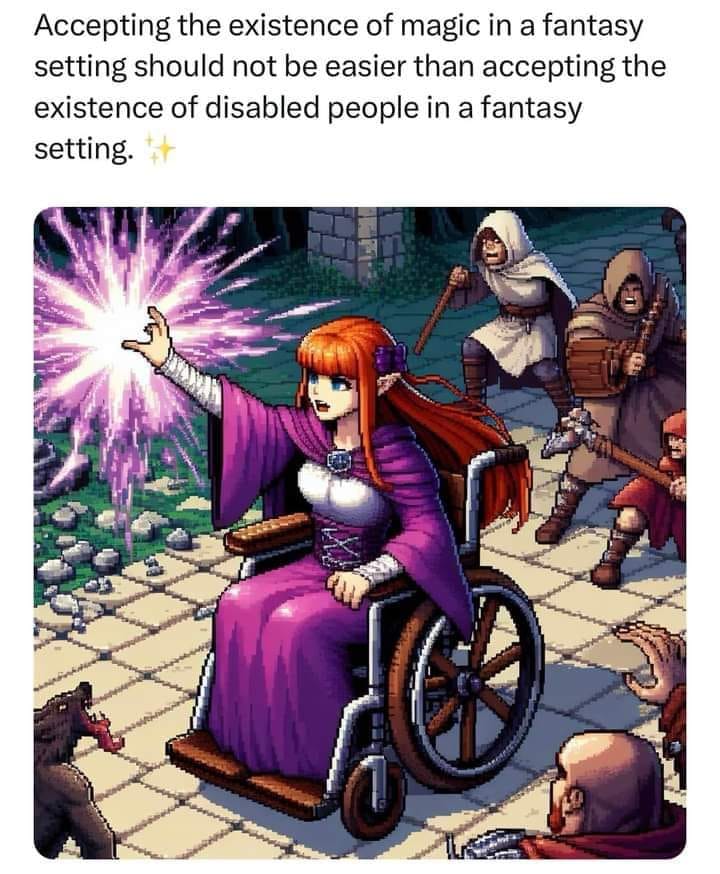If they can't tolerate the idea of a blind NPC existing, good riddance to them. Yeah, sounds like you dodged a bullet.
It's fine, provided it's not a plot hole - i.e. your fantasy setting needs to not have abolished blindness as a realistic malady, which some settings do. E.g. LOTR 100% has blind people, while the Harry Potter universe only has very poor blind people, since solving blindness is as trivial as a polyjuice potion, even if nothing else works (and something more effective is bound to work).
Couldn't a cleric heal partial paralysis tho?
In addition to the list of explanations for why disabled people can exist in a fantasy setting that chumbalumber@lemmy.blahaj.zone provided, I'll also just say:
Using diegetic explanations for why a problematic aspect exists in a piece of fictional media does not address the substance of the problem. The problem is that disability is often not represented in fantasy stories. Pointing out that there's an in-universe explanation for why this may be the case doesn't solve the lack of representation. These stories are fiction, and you can add any explanation for why disabled people exist as easily as you can erase disability completely.
This video does a good job of explaining this some more: https://youtu.be/AxV8gAGmbtk?si=YRvXjpZv_YP9Z5sC
Realistically most adventure parties leave many disabled people (and beasts) in their wake...
I think the real problem is that magic in D&D is so mundane that any problem can be "magicked away", be it healing a wound, curing diseases or exploding an enemy. That makes some situations only really plausible when it's explained as some stronger magic or "weird power" interfering with common magic.
It's a magical fantasy setting, I get it, but magic being so common and consequence free makes it a deus ex of whatever flimsy explanation you can imagine. "Why do disabled people exist in typical D&D?" Cue that meme of the cartoon's Dungeon Master "It's magic, I ain't gotta explain shit".
The thing I find difficult about disability in a TTRPG is that it's something that is either ignorable due to the character backstory (e.g. they have some mcguffin/ability that allows them to operate without difficulty); or it's going to be a repetitive complication that the party has to constantly work around (e.g. the barbarian carries the wheelchair up every set of stairs they encounter).
If it's just flavour, then it seems like less of a disability than a backstory. If it's a constant hassle, then it changes the nature of the game - it becomes more about a party helping each other through individual adversities. The latter sounds fine, but I'm not sure how I'd run it.
I feel like a lot of the time the best way to handle it would be similar to how the character of Toph is presented in the show Avatar: The Last Airbender. She's blind, but has incredibly good seismic sense through her feet. So most of the time, she can "see" just fine. However, it's still a disability, and there are times where it comes up.
If her feet are injured she can't use them to see. If she's on sand her "vision" will be very blurry and imprecise. If she's flying she becomes completely blind. And she can't read anything written on paper.
The disability is a part of her identity, and it absolutely still matters. But it's not so heavily crippling that it's coming up all the time at the table.
In Pathfinder there is a whole subset of assistive items so that all gamers can feel welcome at the table.
I've always wanted to have a DND character that's an armless monk and all they do is kick bad guys to death.
Why would they complain when they could just have the party's healer offer to heal the NPC in exchange for something? That'd be especially great if they were a merchant.
I don't doubt their existence but the wheel chair doesn't look like fantasy.
Reminds me of my favourite Flamethrower  Source Tyrant of tower defence game
Source Tyrant of tower defence game
RPGMemes
Humor, jokes, memes about TTRPGs
